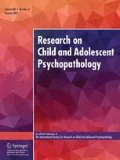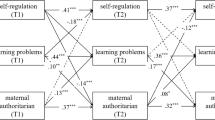Abstract
We examined the development of children’s inhibitory control from toddlerhood to early school-age (i.e., ages 2 to 7.5 years), investigated the effects of the Family Check-Up on the growth of inhibitory control, and explored whether such effects transferred to the school context. Participants were 731 low-income children (49 % female). Results indicated that parental reports of inhibitory control showed positive, nonlinear increase with the growth decelerating over time. Moreover, children in the intervention condition demonstrated higher levels of growth in parental ratings of inhibitory control compared to the control condition. More importantly, the intervention had indirect effects on teacher reports of children’s self-control and oppositional defiant behavior as well as examiner ratings of self-control through its promotion of growth in inhibitory control. The findings are discussed with respect to implications for more specifically targeting the promotion of self-regulation in early childhood in addition to reduction in early problem behavior.


Similar content being viewed by others
References
Achenbach, T. M., & Rescorla, L. A. (2000). Manual for the ASEBA preschool forms and profiles. Burlington: University of Vermont, Research Center for Children, Youth, and Families.
Achenbach, T. M., & Rescorla, L. A. (2001). Manual for the ASEBA school-age forms and profiles. Burlington: University of Vermont, Research Center for Children, Youth, and Families.
Bernier, A., Carlson, S. M., & Whipple, N. (2010). From external regulation to self-regulation: early parenting precursors of young children’s executive functioning. Child Development, 81, 326–339.
Bierman, K. L., Nix, R. L., Greenberg, M. T., Blair, C., & Domitrovich, C. E. (2008). Executive functions and school readiness intervention: impact, moderation, and mediation in the head start REDI program. Development and Psychopathology, 20, 821–843.
Blair, C. (2002). School readiness: Integrating cognition and emotion in a neurobiological conceptualization of children’s functioning at school entry. American Psychologist, 57, 111–127.
Buckner, J. C., Mezzacappa, E., & Beardslee, W. R. (2003). Characteristics of resilient youths living in poverty: the role of self-regulatory processes. Development and Psychopathology, 15, 139–162.
Campbell, S. B., Shaw, D. S., & Gilliom, M. (2000). Early externalizing problems: toddlers and preschoolers at risk for later maladjustment. Development and Psychopathology, 12, 467–488.
Caspi, A., Henry, B., McGee, R. O., Moffitt, T. E., & Silva, P. A. (1995). Temperamental origins of child and adolescent behavior problems: from age three to age fifteen. Child Development, 66, 55–68.
Connell, A., Dishion, T. J., Yasui, M., & Kavanagh, K. (2007). An adaptive approach to family intervention: linking engagement in family-centered intervention to reductions in adolescent problem behavior. Journal of Consulting and Clinical Psychology, 75, 568–579.
Dennis, T. A., Brotman, L. M., Huang, K.-Y., & Gouley, K. K. (2007). Effortful control, social competence, and adjustment problems in children at risk for psychopathology. Journal of Clinical Child and Adolescent Psychology, 36, 442–454.
Dishion, T. J., & Stormshak, E. (2007). Intervening in children’s lives: An ecological, family-based approach to mental health care. Washington, DC: APA Books.
Dishion, T. J., Kavanagh, K., Schneiger, A., Nelson, S., & Kaufman, N. K. (2002). Preventing early adolescent substance use: a family-centered strategy for public middle school. Prevention Science, 3, 191–201.
Dishion, T. J., Shaw, D. S., Connell, A., Wilson, M. N., Gardner, F., & Weaver, C. (2008). The family check Up with high-risk families with toddlers: outcomes on positive parenting and early problem behavior. Child Development, 79, 1395–1414.
Dishion, T. J., Stormshak, E. A., & Kavanagh, K. (2011). Everyday parenting: A professional’s guide to building family management skills. Champaign: Research.
Dishion, T. J., Brennan, L., Shaw, D. S., McEachern, A., Wilson, M. N., & Jo, B. (2014). Prevention of problem behavior through annual family check-ups in early childhood: Intervention effects from home to early elementary school. Journal of Abnormal Child Psychology, 42, 343–354.
Enders, C. K., & Bandalos, D. L. (2001). The relative performance of full information maximum likelihood estimation for missing data in structural equation models. Structural Equation Modeling, 8, 430–457.
Forgatch, M. S., & Patterson, G. R. (2010). Parent management training-Oregon model: An intervention for antisocial behavior in children and adolescents. In J. R. Weisz & A. E. Kazdin (Eds.), Evidence-based psychotherapies for children and adolescents (pp. 159–178). New York: Guilford.
Forman, D. R., & Kochanska, G. (2001). Viewing imitation as child responsiveness: a link between teaching and discipline domains of socialization. Developmental Psychology, 37, 198–206.
Gardner, F., Shaw, D. S., Dishion, T. J., Supplee, L. A., & Burton, J. (2007). Randomized prevention trial for early conduct problems: effects on proactive parenting and links to toddler disruptive behavior. Journal of Family Psychology, 21, 398–406.
Garon, N., Bryson, S. E., & Smith, I. M. (2008). Executive function in preschoolers: a review using an integrative framework. Psychological Bulletin, 134, 31–60.
Gresham, F. M., & Elliot, M. N. (1990). Social skills rating scale manual. Circle Pines: American Guidance Service.
Gross, D., Fogg, L., Webster-Stratton, C., Garvey, C., Julion, W., & Grady, J. (2003). Parent training of toddlers in day care in low-income urban communities. Developmental Psychology, 71, 261–278.
Jones, L. B., Rothbart, M. K., & Posner, M. I. (2003). Development of executive attention in preschool children. Developmental Science, 6, 498–504.
Kochanska, G., & Knaack, A. (2003). Effortful control as a personality characteristic of young children: antecedents, correlates, and consequences. Journal of Personality, 71, 1087–1112.
Li-Grining, C. P. (2007). Effortful control among low-income preschoolers in three cities: stability, change, and individual differences. Developmental Psychology, 43, 208–221.
Loeber, R., & Dishion, T. J. (1983). Early predictors of male delinquency: a review. Psychological Bulletin, 94, 68–99.
Lunkenheimer, E. S., Dishion, T. J., Shaw, D. S., Connell, A., Gardner, F., Wilson, M. N., & Skuban, E. M. (2008). Collateral benefits of the family check Up on early childhood school readiness: indirect effects of parents’ positive behavior support. Developmental Psychology, 44, 1737–1752.
MacKinnon, D. P. (2008). Introduction to statistical mediation analysis. New York: LEA.
MacKinnon, D. P., Fritz, M. S., Williams, J., & Lockwood, C. M. (2007). Distribution of the product confidence limits for the indirect effect: program PRODCLIN. Behavior Research Methods, 39, 384–389.
McDonald, R. P., & Ho, M. H. R. (2002). Principles and practice in reporting structural equation analyses. Psychological Methods, 7, 64–82.
Menting, A. T. A., Orobio de Castro, B., & Matthys, W. (2013). Effectiveness of the incredible years parent training to modify disruptive and prosocial child behavior: a meta-analytic review. Clinical Psychology Review, 33, 901–913.
Miller, W. R., & Rollnick, S. (2002). Motivational interviewing: Preparing people for change (2nd ed.). New York: Guilford.
Moilanen, K. L., Shaw, D. S., Dishion, T. J., Gardner, F., & Wilson, M. (2010a). Predictors of longitudinal growth in inhibitory control in early childhood. Social Development, 19, 326–347.
Moilanen, K. L., Shaw, D. S., & Maxwell, K. L. (2010b). Developmental cascades: externalizing, internalizing, and academic competence from middle childhood to early adolescence. Development and Psychopathology, 22, 635–653.
Muthén, L. K., & Muthén, B. O. (2007). Mplus user’s guide (5th ed.). Los Angeles: Muthén & Muthén.
Olson, S. L., Sameroff, A. J., Kerr, D. C. R., Lopez, N. L., & Wellman, H. M. (2005). Developmental foundations of externalizing problems in young children: the role of effortful control. Development and Psychopathology, 17, 25–45.
Patterson, G., Reid, J., & Dishion, T. (1992). A social learning approach: IV. Antisocial boys. Eugene: Castalia.
Posner, M. I., & Rothbart, M. K. (2000). Developing mechanisms of self-regulation. Development and Psychopathology, 12, 427–441.
Raikes, H. A., Robinson, J. L., Bradley, R. H., Raikes, H. H., & Ayoub, C. C. (2007). Developmental trends in self-regulation among low-income toddlers. Social Development, 16, 128–149.
Raver, C. C. (2004). Placing emotional self-regulation in sociocultural and socioeconomic contexts. Child Development, 75, 346–353.
Raver, C. C., Jones, S. M., Li-Grining, C., Zhai, F., Bub, K., & Pressler, E. (2011). CSRP’s Impact on low-income preschoolers’ preacademic skills: self-regulation as a mediating mechanism. Child Development, 82, 362–378.
Rimm-Kaufman, S. E., Curby, T. W., Grimm, K. J., Nathanson, L., & Brock, L. L. (2009). The contribution of children’s self-regulation and classroom quality to children’s adaptive behaviors in the kindergarten classroom. Developmental Psychology, 45, 958–972.
Rothbart, M. K., & Bates, J. E. (2006). Temperament. In W. Damon, R. Lerner, & N. Eisenberg (Eds.), Social, emotional, and personality development: Vol. 3. Handbook of child psychology (6th ed., pp. 66–166). New York: Wiley.
Rothbart, M. K., Ahadi, S., & Hershey, K. L. (1994). Temperament and social behavior in childhood. Merrill-Palmer Quarterly, 40, 21–39.
Shaw, D. S., Bell, R. Q., & Gilliom, M. (2000). A truly early starter model of antisocial behavior revisited. Clinical Child and Family Psychology Review, 3, 155–172.
Shaw, D. S., Owens, E. B., Giovannelli, J., & Winslow, E. B. (2001). Infant and toddler pathways leading to early externalizing disorders. Journal of the American Academy of Child and Adolescent Psychiatry, 40, 36–43.
Shaw, D. S., Dishion, T. J., Supplee, L., Gardner, F., & Arnds, K. (2006). Randomized trial of a family-centered approach to the prevention of early conduct problems: 2-year effects of the family check-up in early childhood. Journal of Consulting and Clinical Psychology, 74, 1–9.
Shaw, D. S., Connell, A. M., Dishion, T. J., Wilson, M. N., & Gardner, F. (2009). Improvements in maternal depression as a mediator of intervention effects on early childhood problem behavior. Development and Psychopathology, 21, 417–439.
Singer, J. D., & Willet, J. B. (2003). Applied longitudinal data analysis: Modeling change and even occurrence. New York: Oxford University Press.
Stormshak, E. A., Fosco, G. M., & Dishion, T. J. (2010). Implementing interventions with families in schools to increase youth school engagement: the family check-up model. School Mental Health, 2, 82–92.
Wills, T. A., & Dishion, T. J. (2004). Temperament and adolescent substance use: a transactional analysis of emerging self-control. Journal of Clinical Child and Adolescent Psychology, 33, 69–81.
Woodcock, R. W., McGrew, K. S., & Mather, N. (2001). Woodcock-Johnson III Tests of Achievement. Itasca: Riverside.
Acknowledgments
This research was supported by grants 023245 and 2003723 from the National Institute on Drug Abuse to the second, third, and fifth authors. This paper was also supported by Samsung Research Fund, Sungkyunkwan University, 2012 to the first author. We are grateful to the staff and study families of the Early Steps Project for making this research possible.
Author information
Authors and Affiliations
Corresponding author
Rights and permissions
About this article
Cite this article
Chang, H., Shaw, D.S., Dishion, T.J. et al. Direct and Indirect Effects of the Family Check-Up on Self-Regulation from Toddlerhood to Early School-Age. J Abnorm Child Psychol 42, 1117–1128 (2014). https://doi.org/10.1007/s10802-014-9859-8
Published:
Issue Date:
DOI: https://doi.org/10.1007/s10802-014-9859-8




